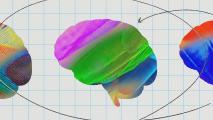New electronic pill zaps the stomach to regulate hunger
MIT researchers have developed an electronic pill that allows them to hack the powerful gut-brain axis — and it could one day be used to treat everything from anorexia to obesity to diabetes.
Your second brain: Your gastrointestinal tract is lined with more than 100 million nerves, known as the “enteric nervous system” (ENS). This system is so complex it’s been nicknamed the “second brain.”
While the ENS controls digestion autonomously, without input from your real brain, the two can and do communicate with one another, using a network of chemical and electrical signals known as the “gut-brain axis.”
Research has linked the gut-brain axis to diabetes, mood disorders, cognition, and more.
When your stomach is empty, for example, endocrine cells in the ENS begin releasing the hormone ghrelin, which then travels via the bloodstream to your brain, causing it to send out signals that you’re hungry.
The gut-brain axis is involved in much more than hunger and digestion, though — research has linked it to diabetes, mood disorders, cognition, and more.
The electronic pill: MIT researchers are now developing a pill that electrically stimulates endocrine cells in the stomach to trigger the release of ghrelin — this could potentially help people with health issues that cause nausea or loss of appetite, such as cancer or anorexia.
They’ve already tested the electronic pill in pigs, and within 20 minutes of ingestion, the animals had elevated levels of ghrelin in their blood. The pill left the pigs’ stomachs after about a day and was excreted within two weeks with no adverse effects.
“As far as we know, this is the first example of using electrical stimuli through an ingestible device to increase endogenous levels of hormones in the body, like ghrelin,” said co-lead author Khalil Ramadi.
How it works: MIT’s electronic pill contains a $1 battery (already approved by the FDA for use in other ingestible devices) that sends a current through tiny electrodes on its surface.
To ensure proper contact with the stomach tissue, the researchers added grooves to the pill’s surface that pull fluid away from the electrodes — that design was actually inspired by a lizard, the Australian thorny devil, whose ridged scales help it collect water from off its skin.
“That surface can manage the fluid that could potentially prevent the electrodes from touching the tissue in the stomach, so it can reliably deliver electrical stimulation,” said co-lead author James McRae.
“We anticipate that this could be used in other sites in the GI tract that we haven’t explored here.”
Giovanni Traverso
Looking ahead: Currently, MIT’s electronic pill runs continuously, but the researchers say future versions could be turned on or off wirelessly. They also believe it may be possible to tweak the pill to address other issues involving the gut-brain axis, such as obesity and diabetes.
“We show one example of how we’re able to engage with the stomach mucosa and release hormones, and we anticipate that this could be used in other sites in the GI tract that we haven’t explored here,” said senior author Giovanni Traverso.
Because the device is “relatively simple,” according to Traverso, it shouldn’t take long to secure approval for clinical trials, either — the MIT team is hopeful testing in humans could begin within three years.
We’d love to hear from you! If you have a comment about this article or if you have a tip for a future Freethink story, please email us at [email protected].





